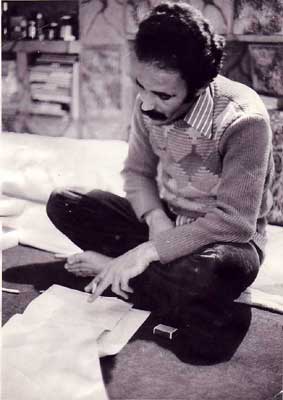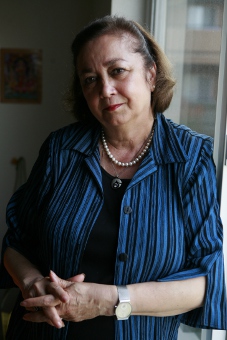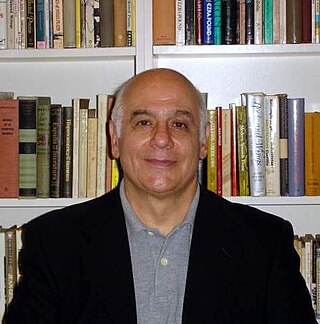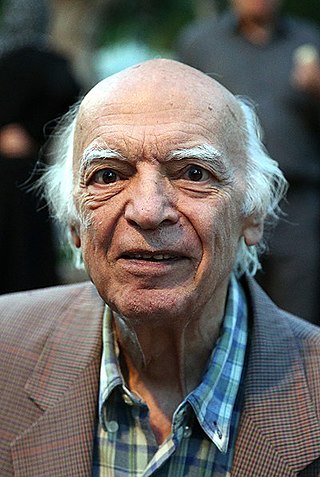
Persian literature comprises oral compositions and written texts in the Persian language and is one of the world's oldest literatures. It spans over two-and-a-half millennia. Its sources have been within Greater Iran including present-day Iran, Iraq, Afghanistan, the Caucasus, and Turkey, regions of Central Asia, South Asia and the Balkans where the Persian language has historically been either the native or official language.

Amir Hushang Ebtehaj, also known by his pen name H. E. Sayeh, was an Iranian poet of the 20th century, whose life and work spans many of Iran's political, cultural and literary upheavals.

Houshang Golshiri was an Iranian fiction writer, critic and editor. He was one of the first Iranian writers to use modern literary techniques, and is recognized as one of the most influential writers of Persian prose of the 20th century.
Abbas Maroufi was an Iranian novelist and journalist. His most famous novel is Symphony of the Dead.

Shahrnush Parsipur is an Iranian-born writer and translator.
Karim Emami was an Iranian translator, editor, lexicographer, and literary critic.

Ata Nahai is a Kurdish-Iranian novelist and short story writer who writes in Sorani Kurdish.

Pegāh Ahmadi is an Iranian poet, scholar, literary critic, and translator of poetry.

Bahman Sholevar is an Iranian-American novelist, poet, translator, critic, psychiatrist and political activist. He began writing and translating at age 13. At ages 18 and 19 he translated William Faulkner's The Sound and the Fury and T. S. Eliot's The Waste Land into Persian, and these still are renowned as two classics of translation in modern Persian literature. In 1967, after his first novel The Night's Journey was banned in Iran, he immigrated to the United States and in 1981 he became a dual citizen of the United States and Iran. Although most of his writings in the past 42 years have been in English, published outside Iran; although The Night's Journey has never been allowed republication, though sold in thousands of unlicensed copies; and although the Persian version of his last novel, Dead Reckoning, has never been given a "publication permit" in Iran, at their latest re-appraisals some Iranian critics have named him "the most influential Persian writer of the past four decades," "one who has had the most influence on the writers of the younger generations."

Reza Ghassemi is an Iranian novelist and musician.

Mohammad Tolouei (Persian: محمد طلوعی; born 1979 as Seid-Mohammad Tolouei-Barazandeh, is an Iranian writer, screenwriter, and playwright.

Najaf Daryabandari was an Iranian writer and translator of works from English into Persian.
The Hooshang Golshiri Literary Award is an Iranian literary award notable for being one of the few literary awards in Iran that is run by a non-governmental organization. Established in 2000, the award is sponsored by the non-profit Golshiri Foundation. The award focuses on modern contemporary Iranian literature. It is named in honor of Hooshang Golshiri, one of the most distinguished pioneers of Iranian modern fiction, who died in 2000. The first award was given in 2001.

One Woman's War: Da (Mother) is a memoir by Seyyedeh Zahra Hosseini detailing her experiences during the Iran–Iraq War as recorded by Seyedeh Azam Hosseini.

Hossein Atashparvar, is an Iranian writer and a literary critic. He belongs to the Third Generation of Iranian writers. He is the editor of the international literary magazine Neveshta.
Abdolmohammad Ayati was an Iranian author, translator and researcher in the field of philosophy, history and Persian and Arabic literature. He was born on 5 May 1926 in Borujerd, Borujerd County, Lorestan Province, Iran and died on 11 September 2013 in Tehran, Iran. He was selected at the second Iran's Book of the Year Awards for Arabic to Persian translation of the book History of Arabic Language Literature.
Alireza Feyz was an Iranian author, researcher of Islamic jurisprudence and Islamic philosophy, professor at the University of Tehran and jurist.

Peyman Esmaeili is an Iranian writer, critic and journalist who has written one novel and three collections of short stories, spanning Iranian modern fictions. He is well known for winning a prestigious literary award in Iran and is identified as one of the leading writers of modern Persian prose.

Ezzatullah Foladvand is a notable Iranian writer and translator renowned for his adeptness in translating complex philosophical works into Persian.
Christophe Balaÿ, was a French professor, linguist and translator known for his contributions to Persian language and Iranian literature. Trained as a comparatist, he held prominent positions, including Professor of Persian at Institut national des langues et civilisations orientales (INALCO), Director of the Institut Français de Recherche en Iran, and Vice President for Research at INALCO.












